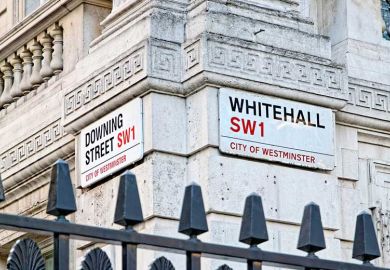The chair of England’s sector regulator has criticised universities for talking about the value of autonomy then calling for “bailouts” to prevent institutions failing and seeking support during the pandemic.
Sir Michael Barber, who will step down as Office for Students chair in March 2021, made the comments during an OfS online event on the relationship between regulator and “regulated” on 3 December.
In 2018, amid concern about the financial health of some universities, Sir Michael said the OfS would not “bail out” struggling institutions. The government has since unveiled its own punitive “restructuring regime” for any universities seeking support to avoid collapse.
The replacement of the former Higher Education Funding Council for England with a regulator had been a “big culture shift, both internally for us and also for the sector itself”, said Sir Michael, in an address reflecting on two years of regulation since the OfS began full operations.
“I’ve often sensed the dilemma in the sector where the message from university leaders and academics is ‘we’re autonomous institutions, we’ve got academic freedom’,” he said in the online event. “We as a regulator totally support that sense of…autonomy. But then the same people who say they want autonomy then say, ‘Why won’t you bail us out?’ The answer to that is autonomy means taking responsibility for your decisions…If you’re autonomous, it’s inconsistent with the idea of a bailout.
“People say ‘we want autonomy’ then when something like the pandemic comes up, or even a more minor problem, people say, ‘Well, what are you going to do?’”
He added that Sir Keith Joseph, the former Conservative minister who was a key force in Thatcherism, had once said that “the first words a baby learns in Britain is, ‘What’s the government going to do about it?’”
“That dilemma of encouraging autonomy, creating a context for autonomous institutions to succeed at the same time as helping the sector come through the challenges it’s bound to face in the century we are in is a dilemma all the time,” Sir Michael continued.
He also said the pandemic had been “challenging at every level of the system”, and he had been “tremendously impressed by the way people [across the sector] have handled that set of challenges”.
Sir Michael put the OfS in the context of the rise of a higher education market following the trebling of tuition fees after the Browne review and the removal of student number controls.
“The rationale for a regulator in our sector is, among other things, to ensure the excesses of the unregulated market are restrained,” he said, pointing to a “previously unregulated market”.
This regulation of the market had seen the OfS act on senior staff pay, “trying to mitigate the rise in grade inflation”, “preventing the abuse of unconditional offers” and “still to come, the identification of courses that are of low value for money but still charge the same fee”, he added.
Register to continue
Why register?
- Registration is free and only takes a moment
- Once registered, you can read 3 articles a month
- Sign up for our newsletter
Subscribe
Or subscribe for unlimited access to:
- Unlimited access to news, views, insights & reviews
- Digital editions
- Digital access to THE’s university and college rankings analysis
Already registered or a current subscriber?








